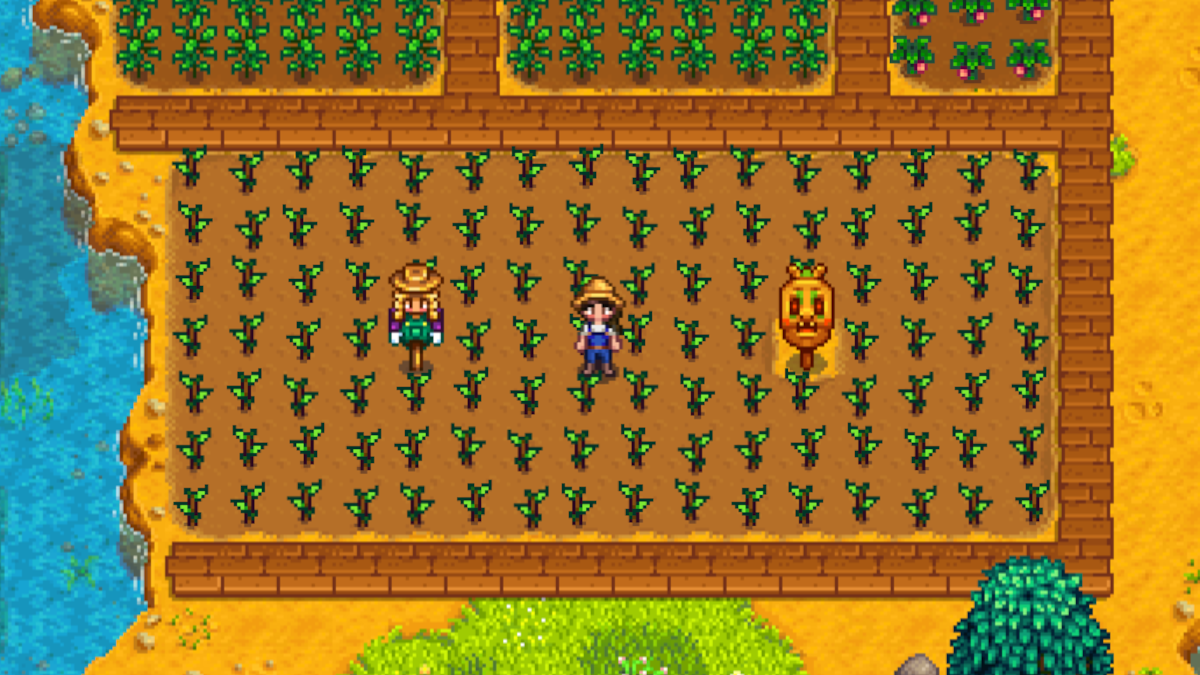One of the biggest facets of Stardew Valley is Farming. You’ve inherited a farm, you need to rebuild it and make money in the process, so one thing you need to figure out is which crops are best for every season.
There are multiple schools of thought about which crop is best in each season. Some people swear by the ‘gold per day’ rule, favoring crops that grow quickly and yield more expensive vegetables, while others tend to favor low-maintenance but constantly producing ones.
I am part of the latter school of thought, so my suggestions will lean towards constantly producing crops for every season except Winter. While these crops may not provide as much profit as some of the other crops, they don’t need to be replanted every time you harvest the crop, which comes with a few benefits:
- Only one initial output of Gold at the beginning of the season
- If you implement sprinklers, you only need to water these crops once when they’re first planted
- At the beginning of a new season, these crops will die but remain in place, preventing you from having to till the land again to plant the next season’s crops
For this article, I’ll use an example plot size of 10 x 10, which would require 100 seeds to fill, and look at the initial set-up cost at the start of the season and how much profit you can stand to gain across the season.
I’m also not going to go into turning these crops into Artisanal Goods, though doing so will massively increase how much Gold you can make from each harvest. The numbers here are based purely on the crops themselves, from the ground directly into the Selling Bin with no additional Profession buffs.
It’s worth noting that you should plant various crops, especially at the beginning of a new game, because these items will be needed for quests or as part of the Bundles within the Community Center.
Table of contents
The best crops for Spring in Stardew Valley

The best Spring crop for profit
In terms of low maintenance crops, Strawberries are the best option for Spring. Strawberries take 8 days to reach maturity. After you first harvest them, you can do so again every four days.
Unfortunately, you can only purchase Strawberry Seeds at the Egg Festival on the 13th of Spring, so buy as many as you can and plant them.
Despite being halfway through the season, you’ll still get two harvests’ worth of Strawberries. Don’t sell these. Craft a Seed Maker instead and place all of your grown Strawberries into it. Each will produce between one and three Seeds, which you can save for year two.
If you plant 100 Strawberry Seeds on the first day of Spring, you’ll get five harvests across the season, each resulting in 100 Strawberries. Even if you put aside 50 Strawberries to turn into seeds for the next year, you’ll make a minimum of 54,000 Gold on the remaining 450, increasing depending on the quality of the fruit.
The best Spring crop for the Community Center
You’ll need to plant and harvest at least one of the following crops so that you can complete the Spring Crops bundle in the Pantry at the Community Center, which will reward 20 Speed-gro Fertilizer:
- Parsnip
- Green Bean
- Cauliflower
- Potato
You’ll also need five gold-quality Parsnips as part of the Quality Crops bundle in the same room.
The best Spring crops for gifting
There are a few different crops you should plant and harvest if you want easy liked or loved gifts for some of the residents of Pelican Town:
- Cauliflower (loved by Maru)
- Parsnip (loved by Pam)
- Strawberry (Loved by Maru and Demetrius)
- Tulip (Loved by Evelyn)
The best crops for Summer in Stardew Valley

The best Summer crop for profit
Blueberries are as equally low-maintenance as Strawberries and follow a similar growth pattern. Blueberries reach maturity after 13 days, and you can re-harvest them every four days after that. However, Blueberries have a significantly higher yield, giving three Blueberries per plant harvested.
Blueberry Seeds cost 80 Gold each, so you’ll need to spend 8,000 Gold at the beginning of Summer to fund a 100-plant plot. While this seems like a high initial cost, you’ll get at least 150 Gold back on a single harvest of a single plant, as Blueberries sell for 50 Gold at the very minimum, so it works out pretty well.
Planting Blueberry Seeds on the first day of Summer will provide you with four harvests across Summer, with each harvest yielding three times as many Blueberries as there are plants. For a 100-plant plot, the minimum income over the Summer season will be 45,000 Gold.
The best Summer crops for the Community Center
If you’re looking to complete the Community Center Bundles, there are a few different Summer crops you should focus on outside of making some quick cash. Firstly, you’ll need the following crops to complete the Summer Crops bundle in the Pantry:
- Blueberries
- Tomato
- Hot Pepper
- Melon
You’ll also need five gold-quality Melons to hand in as part of the Quality Crops bundle, and you can grow some Corn to get a head-start on the Fall Crops bundle or include dive gold-quality ones in the Quality Crops bundle.
It’s a good idea to plant at least one Poppy as well, as it’s an easy option for the Chef’s Bundle on the Bulletin Board. You should also grow some Wheat, as you’ll need 10 of them to hand in as part of the Fodder Bundle.
If you’re into year 2 and haven’t yet completed the Dye Bundle on the Bulletin Board, you can purchase some Red Cabbage Seeds at the General Store and plant them. However, these aren’t available for purchase in the first year unless you get lucky at the Traveling Cart.
The best Summer crops for gifting
During the Summer, it’s a good idea to build up some friendships with villagers who love some of the crops grown during the season. The following crops make easy gifts:
- Hot Pepper (Loved by Lewis and Shane)
- Melon (Loved by Penny)
- Poppy (Loved by Penny)
- Summer Spangle (Loved by Caroline)
- Sunflower (Loved by Haley)
The best crops for Fall in Stardew Valley

The best Fall crop for profit
As with the previous two seasons, Fall offers yet another low-maintenance crop with high returns in the form of Cranberries. This fruit takes seven days to initially reach maturity and then grants additional harvests every five days, with each plant producing two fruits.
Cranberry Seeds cost 240 Gold each, which makes this the most expensive season to set up initially, coming in at 24,000 Gold to fill a 100-plant plot. While this is expensive, if you’ve had a successful Summer growing Blueberries, you should have enough to set up this first sowing in the Fall.
If you plant your Cranberries on the first day of Fall, you’ll get five harvests out of them, with the last harvest being on the 28th day of Fall. Each harvest of a 100-plant plot will provide 200 Cranberries, selling for at the very least 75 Gold each. Across the Fall season, you can look to make at least 75,000 Gold.
The best Fall crops for the Community Center
While hurrying to get through renovating the Community Center, you’ll need to complete the Fall Crops bundle, which needs the following crops:
- Corn
- Eggplant
- Pumpkin
- Yam
You’ll also need five gold-quality Pumpkins for the Quality Crops bundle. If you want an easy way to get an item for the Summer Foraging bundle, you can plant a Grape Starter during the Fall, saving you the effort of finding Grapes in the wild.
The best Fall crops for gifting
There are several crops that are grown during Fall that can be given to villagers to increase their friendship level:
- Beets (Loved by Evelyn)
- Fairy Rose (Loved by Evelyn and Jas)
- Grape (Loved by Vincent)
- Pumpkin (Loved by Krobus, Abigal, and Willy)
- Yam (Loved by Linus)
The best crop for Winter in Stardew Valley: Powdermelon

It goes without saying that nothing really grows in Winter, but with the addition of Powdermelon in update 1.6, there is now a single crop that can be grown throughout Winter to make even a little bit of money.
Powdermelons grow in seven days, producing one Powdermelon per plant. There is a chance that Powdermelons can become a Giant Crop, which will drop between 15 and 25 Powdermelons when destroyed.
The good news is that setting up for planting Powdermelons is free initially, as the seeds are available for free in various ways. However, some work is involved, and you’ll likely only be able to have worthwhile profits beginning in year two.
During your first year, plant and grow any Powdermelon Seeds you find, but don’t sell them. Instead, place them into your seed maker and repeat. At the end of the season and across the following year, use all of your first year’s Powdermelons to produce seeds for the following year.
While you’re not going to get rich off of Powdermelons, and they’re not repeating crops, so you’ll need to replant them after every harvest, it does at least provide some small income over the cold Winter season. Each Powdermelon sells for 60 Gold at the very least, meaning that each harvest from a 100-plant plot will bring in at least 6000 Gold.
Unfortunately, Powdermelon is the only crop that will grow during the Winter unless you have the Greenhouse unlocked, in some Garden Pots inside your house. As such, there’s not really much you can do in terms of the Community Center or gifting to villagers.
How to maximise profits in Stardew Valley

If you’ve finished the Pantry Bundle and you have a fully functioning Greenhouse on your farm, you can plant any crop inside at any time of the year. With 120 plots inside, it’s an easy way to keep income coming in over the Winter without having to worry about Powdermelon Seeds.
Once you’ve repaired the Greenhouse, Evelyn will visit and provide you with the recipe for Garden Pots. These can be placed inside your house or Greenhouse to add extra out-of-season growing space.
Similarly, once you’ve unlocked Ginger Island and opened up the Farm there, you can also grow things out of season there, exactly as you would in the Greenhouse.
There are also various fertilizers that can be used to boost the number of harvests in a month or to increase the quality of fruits from a harvest:
| Fertilizer | Effect on crops | Recipe |
| Improves the quality of soil by a larger amount, increasing the chance to grow high-quality crops | Improves the quality of soil by a small amount, slightly increasing the chance of growing high-quality crops | 2 Sap |
| Quality Fertilizer | Soil has a small chance of retaining water overnight | 2 Sap 1 Fish |
| Deluxe Fertilizer | Basic Fertilizer | 1 Iridium Bar 40 Sap |
| Basic Retaining Soil | Improves quality of soil by a small amount, slightly increasing the chance of growing high-quality crops | 2 Stone |
| Quality Retaining Soil | Soil has a good chance of retaining water overnight | 3 Stone 1 Clay |
| Deluxe Retaining Soil | Soil is guaranteed to retain water overnight | 5 Stone 3 Fiber 1 Clay |
| Speed-Gro | Increases growth rate by at least 10% (for the first harvest) | 1 Pine Tar 5 Moss |
| Deluxe Speed-Gro | Increases growth rate by at least 25% (for the first harvest) | 1 Oak Resin 5 Bone Fragments |
| Hyper Speed-Gro | Increases growth rate by at least 33% (for the first harvest) | 1 Radioactive Ore 3 Bone Fragments 1 Solar Essence |





Published: Nov 21, 2024 08:02 am